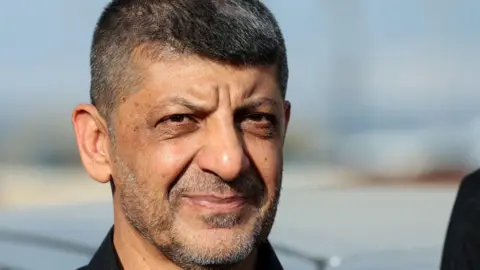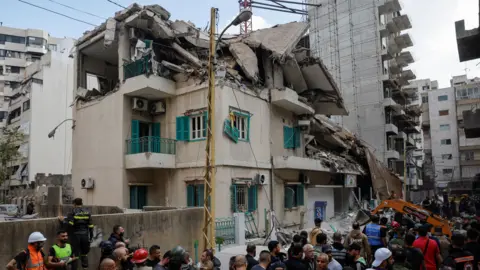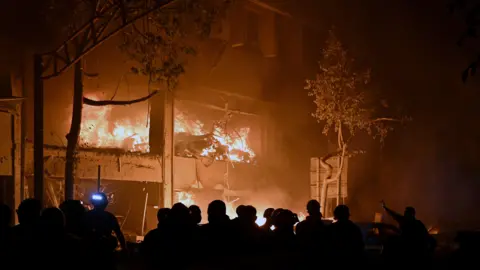 Reuters
ReutersHezbollah’s media chief Mohammed Afif has been killed in an Israeli strike in central Beirut, the Lebanese militant group has confirmed.
A strike hit the headquarters of the Baath political party in the densely populated Ras al-Naba neighbourhood on Sunday, according to Lebanon’s state-run National News Agency.
The country’s health ministry said four people were killed, but did not name the victims.
Afif, one of the few remaining public faces of the group, was last seen on Monday, when he gave a press conference in Beirut’s southern suburbs, where the group is based.
The Israel Defense Forces (IDF) has not commented on the reports.
The BBC has contacted the IDF.
Hezbollah confirmed the death on Sunday evening, several hours after it was first reported.
Most of the headquarters of the Lebanese branch of the Syrian Baath party was destroyed in the strike, as rescue and civil defence teams rushed to aid a number of people trapped under the rubble, the National News Agency reported.
The health ministry said 14 people were injured as well as the four killed.
 Reuters
ReutersThe Lebanese Baath Party is a branch of the Syrian Baath Party, headed by President Bashar Al-Assad, and a long-time Hezbollah ally.
Its Lebanese headquarters are located by a busy central intersection connecting western and eastern Beirut with the city centre and the airport road, which passes through the southern suburbs.
BBC Middle East correspondent Lina Sinjab said the development raised concern that Israel was expanding attacks beyond Hezbollah military officials. Hezbollah is also a political party with representatives in parliament and ministers in government.
“That is really sending alarm to people, that there are no signs of de-escalating this situation or finding a solution, but rather further escalation and widening Israeli targets against Hezbollah in Lebanon,” she told BBC’s news channel.
Later on Sunday, another strike in central Beirut on Mar Elias Street killed two people and wounded 13 more, the Lebanese health ministry said.
 EPA
EPAThe BBC has reached out to the IDF about the second strike in central Beirut.
Earlier on Sunday, the IDF said it had conducted strikes on six Hezbollah military targets in the southern suburbs.
In the past week, the Israeli military has intensified its attacks on Beirut, amid renewed efforts led by the US for a ceasefire in the war.
Israel already killed Hezbollah’s leader Hassan Nasrallah and other top commanders and senior officials in Beirut strikes in late September, when Israel launched an offensive against the Iran-backed group.
Israel said it wanted to return tens of thousands of displaced residents to the country’s north nearly a year after Hezbollah stepped up rocket attacks in support of Palestinians after Hamas’s attack on Israel on 7 October 2023.
More than 3,400 people have been killed in Lebanon since then, including at least 2,600 since Israel launched a intense air campaign followed by a ground invasion in the south in late September, according to the Lebanese health ministry.
Another 1.2 million people have been displaced.

